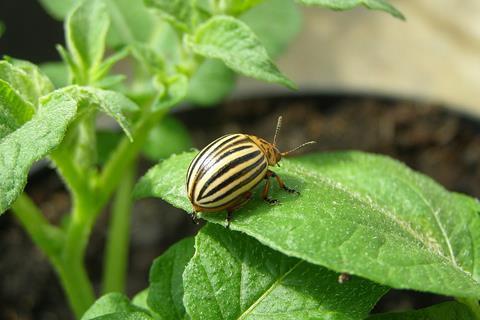Colorado beetle is described as ‘major threat to potato crops’ following confirmed sightings in Kent and suspected hitchhiking on imported produce

Potato growers are being urged to increase vigilance and report any sightings of the invasive Colorado beetle.
The Colorado beetle has the potential to have a significant economic impact on the potato industry without action being taken, according to the government’s Animal and Plant Health Agency (APHA).
The agency has released a new warning and identification factsheet for growers, as well as home gardeners and allotmenteers, after beetle larvae were confirmed in a potato field in Kent following laboratory analysis in 2023 and further recent sightings.
There were outbreaks in the 1930s, 50s and 70s but the pest was eradicated due to inspections and public vigilance.
Adult beetles and larvae feed on the foliage of potatoes and several other plants, including tomatoes, aubergines and peppers, and can strip all leaves if left uncontrolled.
“The Colorado beetle poses a significant threat to plants and the wider potato industry,” said Defra chief plant health officer, Professor Nicola Spence.
“The public have an important role to play in helping us take swift and effective action to protect UK biosecurity. The public are urged to be vigilant and report suspected sightings to the Animal and Plant Health Agency with a photo and location details.”
The beetle’s body is yellow or cream with 10 black stripes and it has an orange head with irregular black spots. It is usually between 6 to 11mm in length and 3mm in width. Its larvae are a pinkish red or orange colour, with black spots along each side and a black head and are up to 15mm in length.
The beetles have been known to be imported into the UK as ‘hitchhikers’ on plants, such as leafy vegetables, salad leaves, fresh herbs, grain and frozen vegetables, and APHA is urging people to keep an eye out when handling these items.
APHA interim chief executive Dr Jenny Stewart said: “Public vigilance was key to eradicating the beetle in the 1970s, and we really need home gardeners, allotmenteers and farmers to step up again, and identify and report suspected sightings to protect potato crops.
“Our surveillance capabilities protect UK borders from a wide range of plant pests and diseases, including the Colorado beetle, but we cannot do this without the help of the public.”
Growers should report suspected sightings to APHA by ringing 0300 1000 313 or emailing planthealth.info@apha.gov.uk, with a photograph and location details.
A factsheet has further information for identification.



